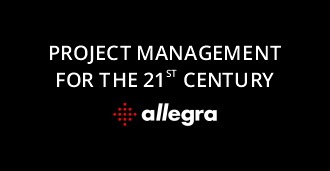Understanding Effectiveness and Efficiency
Overview
Effectiveness and Efficiency are both elements to any project that will contribute to achieving success. Striking a balance between effectiveness in tasks carried out and efficiency will be key to longevity and timeliness of any given project.
At Allegra we are big fans of a great project, hence the specialisation in project management software! This blog is going to run through the key pointers of understanding efficiency and effectiveness and what exactly the difference is. With also taking notes of how to chose which to prioritise and why they do work together!
Firstly, it’s important to understand that effectiveness is definitely not the same as efficiency.
Effectiveness is defined as:
noun
1. the degree to which something is successful in producing a desired result; success.
“the effectiveness of the treatment”
Sourced: Google (4 August 2021)
Whereas
Efficiency is defined as:
noun
1. the state or quality of being efficient.
“greater energy efficiency”
Sourced: Google (4 August 2021)
According to the Oxford Dictionary, both expressions can be used interchangeably and synonymously. However, they are slightly different in meaning and this conclusion cannot be applied to Project Management. Both terms but be clearly differentiated from each other as effectiveness is certainly not the same as efficiency. The distinction between these terms can be mainly attributed to the connection with time management and productivity.
Successful projects are goal oriented and also attempt to be resource aware (ie. resource saving is preferable). The mindset between reaching your goal by doing “less” work is outdated. We like to say, work smart not hard. In the same breath, Allegra focuses on effective results and efficient project phases above all else. Project managers seek effective and efficient working (especially in their every-day tasks).

As defined above we will now unpack more under the headings above
Effectiveness and efficiency definitions explained
Above are the official definitions of effectives and efficiency. But what is the difference in more practical terms?
To be effective occurs when an implemented measure leads to the desired goal. It is determined by what is necessary to do in order to achieve a planned/desired goal as successfully as possible . When working effectively, the only paths taken are those that ultimately make the company’s goal possible. This is primarily about the question of WHAT has to be done. What are the “right” things that will bring the greatest benefit to the company and assist in achieving a goal.
When working efficiently, the previously defined measures of effectiveness should be completely optimized. The goal should therefore be achieved in as little (time) expenditure as possible . There is a relationship established between the effort required and the income . Efficiency is therefore also a measure of the profitability of a company. Thus, the focus is on questions such as: How are the resources being best used? How much effort is actually required to complete a task? It’s all about the ‘HOW’.
Which is more important – effectiveness or efficiency?
This is where the confusion comes in for projects. Often times the project management style comes into play here. The difference between the two terms has now been clarified (above). But what attribute is actually better? Effectiveness or efficiency? The answer is most definitely a combination of both .
It should be the goal of every organization and will lead to the perfect result on a project! If companies concentrate exclusively on effective work, the result will be achieved, but input and output are not properly proportioned and may perhaps take longer than needed. Which merely wastes resources unnecessarily!
Is efficiency always effective?
Simply put, no. Projects can be done efficiently without being totally effective. This is because a task can be completed efficiently without defined guidelines. However, it is questionable how useful and expedient this really is. Because in most cases just being efficient is unfortunately not enough to achieve the goals and tasks set out. Being efficient is not useful when working on the wrong things, in other words, it may be a great skill to make use of resources in the best way possible, but efficiency will only truly create value if used within the guidelines of effectiveness.
Therefore, effectiveness must always come before efficiency. The right steps in the project must first be determined, then processes and methods can be optimized by means of efficiency. First effectiveness, then efficiency.
Effectiveness and Efficiency in Project Management
In day-to-day business, your team may effectively fights its way through a project. Tasks are completed until a project goal is achieved. The right things are done on time. Now, however, the question arises – Was the completion of these goals and tasks not only effective, but also efficient ? In project management, both effective and efficient approaches are advantageous in order to implement a project in the best possible way . So from a project management perspective, as we have previously discussed it really just is very important to strike a balance! This means one must implement goals “correctly”!
Project managers must be clear and aware of which overarching corporate goals are being pursued and what that means for the individual projects underway. Suitable effective methods in project management are, for example, the Waterfall project management method or the setting SMART goals (Specific, Measurable, Attainable, Realistic and Timely). In both approaches, the goals are very explicitly and clearly defined and the project phases are set before the start of the project.
The project profile is created and the relevant project planning provide an overview and structure the project process.
Complemented by the appropriate efficient method, the right projects are also implemented with the least amount of effort . Detailed capacity planning and successful time management are important for project managers to always take control of.
Create more efficiency with the right Project Management software
With all of the above in mind, you need to make sure that your projects are well structured and controlled. Large projects cannot be implemented via e-mail or with the help of Excel tables anymore, they require a more flexible solution .Project Management Software is suitable for companies of all sizes can continuously optimizes the entire process. In most project organizations, a cloud-based software solution is already part of the basic equipment and everyday business life can no longer be imagined without it.
For more info on whether a cloud or premise software system is advised check out this blog.
Flexible despite location-independent work
A major advantage lies in how Project Management Software supports you in your day-to-day work, regardless of where you work. The pandemic showed to necessity of this! With the right software, project participants have access to current data at any time and from anywhere. This means that all employees have the same status, so that structured and productive processing of the tasks at hand is made possible!
The Kanban Board (see this!) can, for example, sort tasks according to due date or priority and visualize what is currently due. This means that team members know exactly which tasks are “on” and keep an eye on all to-dos.
Allegra is ideal and assist with the best kind of scheduling. In order to further increase efficiency, suitable time planning and management is particularly important . As a result, not only are those involved in the project better organized, the project manager can also better coordinate resources such as work material, budget and personnel all on the same platform.
The customisable dashboards available with Allegra shows all of an employee’s tasks as a bar and thus prevents overcrowding. Even with projects running in parallel, the software technology can show which employee is currently available so that the team leader can more easily distribute tasks to available employees. In addition, the software can indicate just how busy someone might be and in the event of an unforeseen change in plan , such as illness, the planning can be adjusted flexibly on Allegra.
Summary
All things considered, effectiveness and efficiency go hand in hand. In everyday project life there is a clear distinction between the two terms “effective” and “efficient” . First a target-oriented method is found. Only then does the question of productivity (in time management and resource management) or profitability arise.
The overriding rule is: Effectiveness always comes before efficiency, but only when worked together do they deliver the perfect result for day-to-day project work .
Should you be working on a project right now (individually, in a small group or a large one) you should definitely do so with the best software on your side. The advanced Allegra formulas, deliver the most incredible capabilities to help you along the way. If you’re interested in giving Allegra Project Management software a try, give the free demo a shot on the website. Also feel free to get in touch through the website with any other questions you might have.
Interested in hearing what other people think? Have a look at some reviews.




